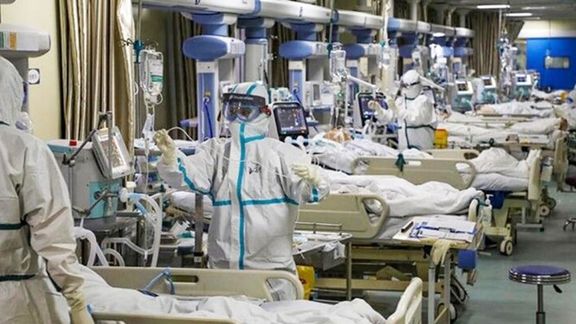Under Pressure From Hardliners Iran Health Ministry Rules Out Pfizer Vaccines

Iran’s health ministry said Tuesday that use of the China’s Sinopharm Covid-19 vaccine would continue for pregnant women and ruled out the United States-made Pfizer.

Iran’s health ministry said Tuesday that use of the China’s Sinopharm Covid-19 vaccine would continue for pregnant women and ruled out the United States-made Pfizer.
A ministry statement said the issue had been discussed at the cross-government National Vaccination Committee. Health minister Bahram Eynollahi had said on September 23 that some US-made vaccines would be imported for vaccinating expectant mothers but would not be generally available.
Data over vaccines in pregnancy has been limited. While a major study earlier in the year deemed the US-made Pfizer and Moderna safe for expectant mothers, the World Health Organization has also recommended they receive Sinopharm.
A few days ago, Fars news agency, which is affiliated to the Revolutionary Guards (IRGC), launched an online campaign against importing Pfizer vaccines. On Tuesday Fars quoted Professor Ali Karami, a controversial biotechnology professor at the IRGC Baqiyatallah University of Medical Sciences, saying the Pfizer vaccine contained a "group of genes" that could affect the recipient’s DNA. "Professor Karami's statement is a warning to take immediate action and not to put pregnant mothers and the future generation at risk," Fars noted.
Karami who has advocated other conspiracy theories in the past and ardently opposes the use of US-made vaccines claims that the US has created a vaccine to reduce religious fundamentalism with which the Pentagon could vaccinate large populations in the Middle East. "The virus in this vaccine purportedly has been tested and shown to reduce fundamentalism and religiosity in all who are infected by damaging what is called the GOD gene," Karami said at a conference in 2016.
Iran has now fully vaccinated 17 percent of the population, according to figures from John Hopkins University. Daily Covid deaths peaked at around 700 in August during a fifth wave of the pandemic but in recent weeks have fallen to under 300.
According to the latest figures released by the health ministry, 37.7 million of 84 million Iranians have received one dose and 16 million both doses of the Covid vaccine, a total of 53.8 million.
Many hardliner political, military and media figures in Iran welcomed Supreme Leader Ali Khamenei’s January 8 order to ban importing the US-made Pfizer and Moderna, and British-made AstraZeneca, vaccines based on conspiracy theories that the West can contaminate the vaccines to harm Iranians.
While many hardliners supported Khamenei’s decision, as they usually do in all matters, Pfizer, Moderna, and AstraZeneca were at the time the only Covid vaccines provided through the World Health Organization’s Covax facility.
On August 16, the head of Iran's Food and Drug Administration (FDA), Mohammad-Reza Shanehsaz, said a permit had been issued to import Pfizer and Moderna vaccines. Shanesaz stressed that Khamenei's concerns were being addressed and that while any source should be reliable "a vaccine's name" was not sufficient reason to stop its import.